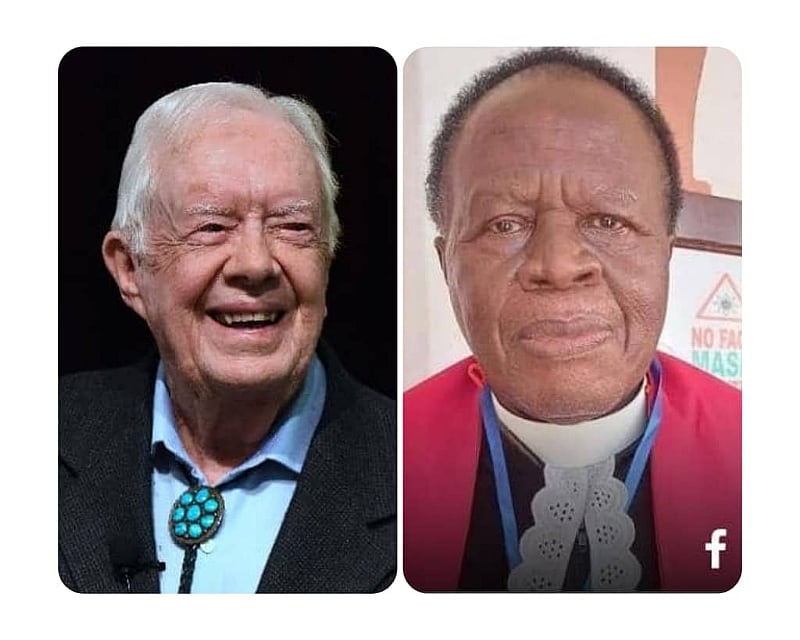Jimmy Carter, the 39th President of the United States, left an enduring mark on the world, a legacy that extended far beyond the political sphere. His life, spanning a remarkable century, was a testament to service, compassion, and an unwavering commitment to peace. From his humble beginnings as a peanut farmer in Plains, Georgia, to the highest office in the land, and then to his tireless post-presidency work as a global humanitarian, Carter’s journey was defined by an unwavering dedication to improving the lives of others. His recent passing has elicited an outpouring of grief and tributes from across the globe, including a particularly poignant reflection from Very Rev. Jubilant Boakye Danquah, an African scholar studying in Atlanta, Georgia. Rev. Danquah’s perspective, shaped by both his academic pursuits and his personal experiences, offers a unique and heartfelt appreciation of Carter’s impact on the world, particularly on the African continent.
Rev. Danquah’s tribute underscores the multifaceted nature of Carter’s life. He acknowledges Carter not simply as a former president, but as a man of deep faith, a devoted husband and family man, and a tireless advocate for peace and human rights. Carter’s 77-year marriage to Rosalynn served as a bedrock of his life, a testament to his commitment to family and his shared faith. His dedication to spreading the “good news” reflected his deeply held beliefs and his desire to connect with others on a spiritual level. This foundation of faith informed his approach to leadership and service, guiding his actions and shaping his legacy. From his early days as a naval officer to his time as Governor of Georgia, and culminating in his presidency, Carter’s life was characterized by a profound sense of duty and a commitment to serving others.
Carter’s presidency, though only a single term, was marked by significant events, including the Iran hostage crisis, a challenging period that tested his leadership and diplomatic skills. Despite this and other complexities, Carter’s vision for a more peaceful and just world never wavered. His post-presidency work, through the establishment of the Carter Center, further solidified his commitment to these ideals. The Center became a powerful force for good, addressing critical issues such as human rights violations, global health crises, and the promotion of democracy around the world. This work earned him the Nobel Peace Prize in 2002, a testament to his enduring commitment to peace and conflict resolution.
Beyond the political arena, Carter’s humanitarian efforts resonated deeply with communities across the globe. Rev. Danquah, speaking from an African perspective, highlights Carter’s intervention in Sierra Leone, where he played a crucial role in preventing the military amputation of soldiers and advocating for the rights of Sierra Leonean youth. His efforts to combat guinea worm disease in Nsawkaw, Ghana, further exemplify his compassionate approach to addressing the suffering of others, particularly in developing nations. These actions, far removed from the political stage, demonstrated Carter’s genuine concern for human well-being and his unwavering dedication to alleviating suffering wherever he found it.
Carter’s approach to diplomacy and international relations was characterized by a commitment to peaceful resolution and a rejection of aggressive interventionism. He recognized the importance of dialogue and understanding in resolving conflicts, and his efforts to mediate the Camp David Accords between Israel and Egypt stand as a testament to his diplomatic prowess. This achievement, creating a framework for peace in the Middle East, served as a blueprint for future presidents and solidified Carter’s reputation as a peacemaker. His work to manage nuclear weapons proliferation in Iran and Iraq further underscored his commitment to preventing global conflict and promoting international security. Rev. Danquah recognizes Carter’s “diplomatic intelligence” and his principled approach, highlighting his ability to navigate complex international relationships with wisdom and integrity.
Jimmy Carter’s passing represents a significant loss not just for the United States, but for the entire world. His life, a testament to service, humility, and compassion, has left an indelible mark on countless individuals and communities. From his political achievements to his humanitarian work, Carter’s legacy continues to inspire. Rev. Danquah’s heartfelt tribute captures the essence of this remarkable man, highlighting his profound impact on the global community and offering a poignant reminder of the importance of peace, service, and unwavering commitment to the betterment of humanity. His words echo the sentiments of many across the world who recognize Carter not just as a former president, but as a moral compass, a champion for the marginalized, and a symbol of hope for a more just and peaceful world.














